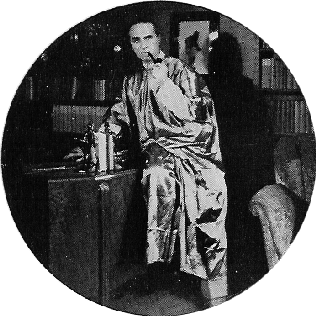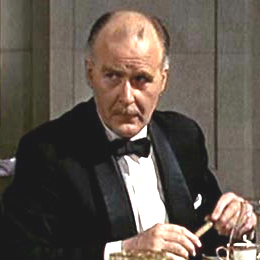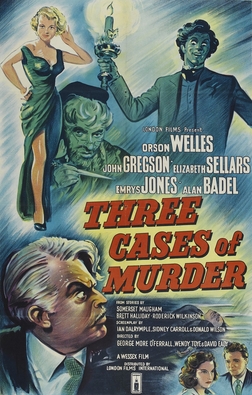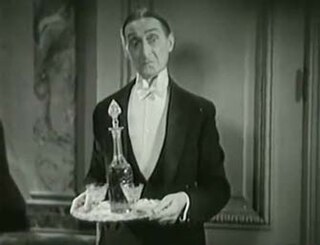
Arthur Henry "Sarsfield" Ward, better known as Sax Rohmer, was an English novelist. He is best remembered for his series of novels featuring the master criminal Fu Manchu.

Phineas Finn is a novel by Anthony Trollope and the name of its leading character. The novel was first published as a monthly serial from 1867 to 1868 and issued in book form in 1869. It is the second of the "Palliser" series of novels. Its sequel, Phineas Redux, is the fourth novel in the series.

Most United States presidents have kept pets while in office, or pets have been part of their families. Only James K. Polk, Andrew Johnson, and Donald Trump did not have any presidential pets while in office.

The Royal Company of Archers, The King's Bodyguard for Scotland, is a ceremonial unit that serves as the Sovereign's bodyguard in Scotland—a role it has performed since 1822 during the reign of King George IV when the company provided a personal bodyguard to the King on his visit to Scotland. It is currently known as the King's Bodyguard for Scotland or, more often and colloquially, The Royal Company. It is located in Edinburgh, the capital city of Scotland. The Royal Company of Archers has a long history in Scotland as a body that celebrated both the recreation and talent of local archers. As a body established by the Monarch, the company has a long history of unique prizes, influential supporters, and ceremonial roles. It has an associated charity, the Royal Company of Archers Charitable Trust, dedicated to helping disadvantaged individuals with their health and wellbeing in Scotland.

Sir George Murray was a British soldier and politician from Scotland.

George Ambrose Lloyd, 1st Baron Lloyd, was a British Conservative politician and colonial administrator who was strongly associated with the "Diehard" wing of the party. From 1937 to 1941, he was chairman of the British Council in which capacity he sought to ensure support for Britain's position during the Second World War.

Richard Evelyn Vernon was a British actor. He appeared in many feature films and television programmes, often in aristocratic or supercilious roles. Prematurely balding and greying, Vernon settled into playing archetypal middle-aged lords and military types while still in his 30s. He is perhaps best known for originating the role of Slartibartfast in The Hitchhiker's Guide to the Galaxy. Other notable roles included the lead role of Edwin Oldenshaw in The Man in Room 17 (1965–67), Sir James Greenley alias "C" in The Sandbaggers (1978–80), and Sir Desmond Glazebrook in Yes Minister (1980–81) and its sequel series Yes, Prime Minister (1987).

Sir John Macpherson, 1st Baronet, was a British administrator in India. He was the acting Governor-General of Bengal from 1785 to 1786.

Blackstar is an American animated science fantasy television series, produced in 1981 by Lou Scheimer and Norm Prescott for Filmation. The series was Filmation's second fantasy epic, the first being The Freedom Force, a segment of Tarzan and the Super 7. Blackstar has many notable similarities to He-Man and the Masters of the Universe which was produced shortly afterwards.
Patrick Carman is an American writer and a graduate of Willamette University.

Percy Reginald Lawrence-Grant was an English actor known for supporting roles in films such as The Living Ghost, I'll Tell the World, Shanghai Express, The Mask of Fu Manchu and Son of Frankenstein. He was host of the 4th Academy Awards ceremonies in 1931.

John Derek Carson-Parker, known as John Carson, was an English actor known for his appearances in film and television.
The Palliser novels are six novels written in series by Anthony Trollope. They were more commonly known as the Parliamentary novels prior to their 1974 television dramatisation by the BBC broadcast as The Pallisers. Marketed as "polite literature" during their initial publication, the novels encompass several literary genres including: family saga, bildungsroman, picaresque, as well as satire and parody of Victorian life, and criticism of the British government's predilection for attracting corrupt and corruptible people to power.

Three Cases of Murder is a 1955 British horror omnibus film comprising three stories: "In The Picture," "You Killed Elizabeth," and "Lord Mountdrago." Eamonn Andrews introduces each. Alan Badel appears in all three.

The Dark Hills Divide is a (2005) children's fantasy and mystery novel by Patrick Carman. It is the first book in The Land of Elyon series, which focuses on the adventures of Alexa Daley, who is the daughter of Mr. Daley, the mayor of fictional Lathbury.

Sir Charles Henry Knowles, 2nd Baronet, GCB was an officer of the Royal Navy, who saw service during the American War of Independence, and the French Revolutionary and Napoleonic Wars, eventually rising to the rank of Admiral. He was an extraordinary figure and a great tactical innovator. Highly intellectual, he authored a number of signal books and had the chance to put his ideas into practice during his naval career. Knowles was at times beset by problems with discipline aboard his ships, often due to large proportions of raw recruits and untrained seamen. This may have been a factor in his rocky relationship with his superior, Sir John Jervis, which eventually led to Knowles's retirement from active service after the Battle of Cape St Vincent, and his concentration on scholarly studies of the issues affecting the naval service.

Edgar Norton was an English-born American character actor.
The House That Swift Built is a 1982 Soviet fantasy comedy-drama film directed by Mark Zakharov based on the eponymous play by Grigori Gorin about Irish satirist writer and Anglican priest Jonathan Swift.

Phineas and Ferb the Movie: Candace Against the Universe is a 2020 American animated musical science fiction comedy film based on the animated television series Phineas and Ferb, created by Dan Povenmire and Jeff "Swampy" Marsh. Directed by Bob Bowen, who co-wrote it with Povenmire, Marsh, and several other writers, it is the second film based on the series following Across the 2nd Dimension (2011). Set at some point during the summer depicted in the series and before the fourth season finale, "Last Day of Summer", the film follows Phineas and Ferb as they rescue their sister Candace and Dr. Doofenshmirtz's daughter Vanessa from the planet Feebla-Oot. However, Candace becomes tempted to stay on the planet when she is treated with respect by its people, not knowing that they harbor a dark secret which involves her presence.
















